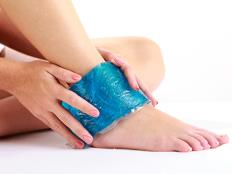Prepare Mentally and Physically
During training, you will be logging a number of miles each week, but be sure to include cross-training and strength workouts to complement your running, build strength, and prevent injury.
Try to complete your workouts outside whenever possible. The race will be run outdoors and most likely on the street, so it's important to get used to running on hard surfaces. The treadmill is an acceptable substitute at times if you can't run outside due to weather, safety or other circumstances.
There will most likely be days where you don't feel like training, and you may question why you started in the first place. It's important to keep yourself motivated and mentally focused.
"What's going to get you through this process is very individual," Flynn says. "Think about why you're doing this event. Did you sign up for a loved one or family member, are you running for charity, or is it a personal goal? Whatever your reason, make it you mantra. When times get tough you can remind yourself why you started."
More: 3 Tips to Build Mental Toughness
Rest and Recovery
Adequate rest is essential after workouts and between training sessions to avoid burnout and prevent injuries.
Make sure you warm-up before a run and do a proper post-run cooldown.
You will need to adjust your nutrition to accommodate your activity level. Make sure to consume food within 30 minutes to 1 hour after a training run. Your post-workout meal or snack should have a 3:1 ratio of carbohydrates to protein.
If you can't eat right away after a run, replenish your system with a snack such as a handful of pretzels or nuts, a banana or chocolate milk.
More: 3 Post-Workout Meals That Lower Inflammation
Race Day
You have trained for months and the big day is finally here, but there are certain things you should keep in mind on race day in order to make the most of your experience.
Remember proper fueling is essential, so start your day off with a good breakfast. Plan ahead: Eat a nutritious, high-carb meal and give yourself at least 2 to 3 hours to digest your food. Flynn suggests eating oatmeal and fruit or a bagel with peanut butter and a banana. You can always top off your glycogen and fluid stores by sipping a sports drink an hour to minutes before the start.
Rookie runners have a tendency to start the race too fast. You may have trained at one pace, but it's not uncommon to start running at a much faster pace due to nerves and adrenaline. Be cognizant of this when you start your race.
"I like to tell people that the biggest mistakes are made in the beginning, and these set you up for the difficult part, which is the end," Flynn says. "That gun goes off and you're so excited after months and months of training; the adrenaline kicks in and people go out too fast too soon."
Remember to enjoy the experience. Regardless of your time, this is the culmination of all your training, and a huge personal accomplishment. Pace yourself so you can finish strong and cross the finish line with a smile on your face.
More: 7 Ways to Prepare For Your First Marathon
 Ready to run? Search for a race.
Ready to run? Search for a race.- 2
- of
- 2
About the Author

Get ACTIVE on the Go


Couch to 5K®
The best way to get new runners off the couch and across the finish line of their first 5K.
Available for iOS | Android






Discuss This Article